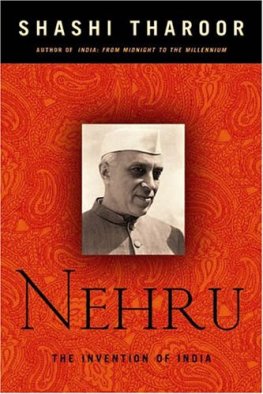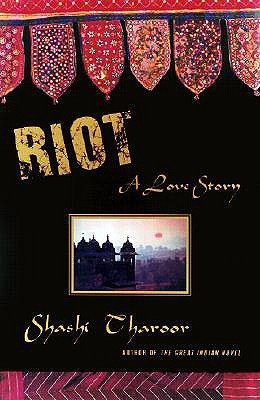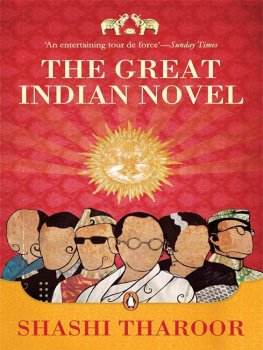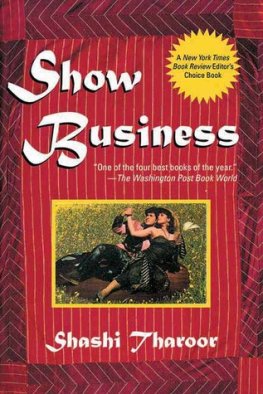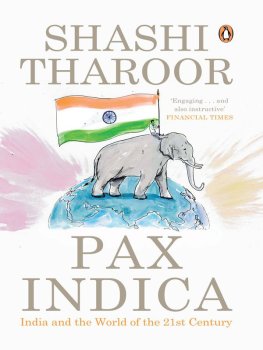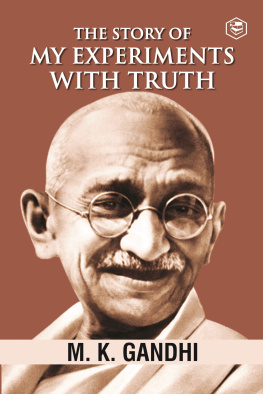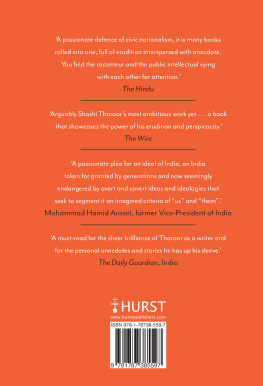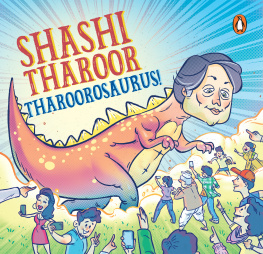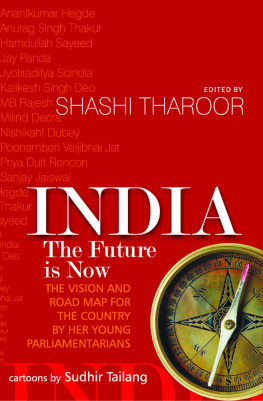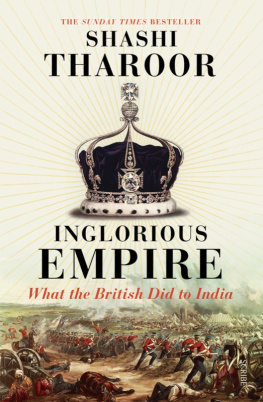Tharoor Shashi - Nehru: The Invention of India
Here you can read online Tharoor Shashi - Nehru: The Invention of India full text of the book (entire story) in english for free. Download pdf and epub, get meaning, cover and reviews about this ebook. year: 2004, publisher: Arcade Publishing, genre: Non-fiction. Description of the work, (preface) as well as reviews are available. Best literature library LitArk.com created for fans of good reading and offers a wide selection of genres:
Romance novel
Science fiction
Adventure
Detective
Science
History
Home and family
Prose
Art
Politics
Computer
Non-fiction
Religion
Business
Children
Humor
Choose a favorite category and find really read worthwhile books. Enjoy immersion in the world of imagination, feel the emotions of the characters or learn something new for yourself, make an fascinating discovery.
- Book:Nehru: The Invention of India
- Author:
- Publisher:Arcade Publishing
- Genre:
- Year:2004
- Rating:5 / 5
- Favourites:Add to favourites
- Your mark:
- 100
- 1
- 2
- 3
- 4
- 5
Nehru: The Invention of India: summary, description and annotation
We offer to read an annotation, description, summary or preface (depends on what the author of the book "Nehru: The Invention of India" wrote himself). If you haven't found the necessary information about the book — write in the comments, we will try to find it.
Nehru: The Invention of India — read online for free the complete book (whole text) full work
Below is the text of the book, divided by pages. System saving the place of the last page read, allows you to conveniently read the book "Nehru: The Invention of India" online for free, without having to search again every time where you left off. Put a bookmark, and you can go to the page where you finished reading at any time.
Font size:
Interval:
Bookmark:
Shashi Tharoor
Nehru: The Invention of India
To Kofi Annan,
who, as a young man in Ghana,
admired Nehru,
this book is dedicated
with respect and affection
Preface
For the first seventeen years of Indias independence, the paradox-ridden Jawaharlal Nehru a moody, idealist intellectual who felt an almost mystical empathy with the toiling peasant masses; an aristocrat, accustomed to privilege, who had passionate socialist convictions; an Anglicized product of Harrow and Cambridge who spent almost ten years in British jails; an agnostic radical who became an unlikely protg of the saintly Mahatma Gandhi was India. Upon the Mahatmas assassination, Nehru became the keeper of the national flame, the most visible embodiment of Indias struggle for freedom. Incorruptible, visionary, ecumenical, a politician above politics, Nehrus stature was so great that the country he led seemed inconceivable without him. A year before his death a leading American journalist published a book entitled After Nehru, Who? The unspoken question around the world was: after Nehru, what?
Today, nearly four decades after his death, we have something of an answer to the latter question. As an India still seemingly clad in the trappings of Nehruvianism steps out into the twenty-first century, little of Jawaharlal Nehrus legacy appears intact. India has moved away from much of it, and so (in different ways) has the rest of the developing world for which Nehruvianism once spoke. As India nears the completion of the sixth decade of its independence from the British Raj, a transformation still incomplete has taken place that, in its essentials, has changed the basic Nehruvian assumptions of postcolonial nationhood.
In this short biography, I have sought to examine this great figure of twentieth-century nationalism from the vantage point of the beginning of the twenty-first. Jawaharlal Nehrus life is a fascinating story in its own right, and I have tried to tell it whole, because the privileged child, the unremarkable youth, the posturing young nationalist, and the heroic fighter for independence are all inextricable from the unchallengeable prime minister and revered global statesman. A concluding chapter critically analyzes the principal pillars of Nehrus legacy to India democratic institution-building, staunch pan- Indian secularism, socialist economics at home, and a foreign policy of nonalignment all of which were integral to a vision of Indianness that is fundamentally contested today.
Nehru: The Invention of India is not a scholarly work; it is based on no new research into previously undiscovered archives; it is not footnoted, though a Note on Sources and a Select Bibliography will guide the curious toward further reading. It is, instead, a reinterpretation both of an extraordinary life and career and of the inheritance it left behind for every Indian. The very term Indian was imbued with such meaning by Nehru that it is impossible to use it without acknowledging a debt: our passports incarnate his ideals. Where those ideals came from, whether they were brought to fulfillment by their own progenitor, and to what degree they remain viable today are among the themes of this book. I started it as divided between admiration and criticism as I finished it; but the more I delved into Nehrus life, it was the admiration which deepened.
Jawaharlal Nehrus impact on India is too great not to be reexamined periodically. As an Indian writer, I am conscious that his legacy is ours, whether we agree with everything he stood for or not. What India is today, both for good and for ill, we owe in great measure to one man. This is his story.
A Note on Indian
Political Movements
This book mentions a number of Indian political parties and movements of importance to understanding Jawaharlal Nehrus life and times and appreciating his legacy.
The Indian National Congress was founded in 1885 by a liberal Scotsman, Allan Octavian Hume, to provide a forum for the articulation of an Indian viewpoint on issues of the countrys governance and political development. The Congress evolved into the countrys premier political party (whose annual sessions, in different venues around India, attracted ever-greater attendance and attention). Its leadership was initially drawn from the educated professional classes, and its presidents, who were elected annually, belonged to various faiths, with Hindus, Muslims, Christians, and Parsis among the first two dozen presidents. Around the cusp of the century a schism developed within the Congress between the Extremists, led by Tilak, and the Moderates, led by Gokhale the former seeking more radical action to overthrow the British, the latter pursuing their goals through constitutional means while seeking fundamental reforms leading to self-government. This schism ended around the time of the First World War.
The advent of Mahatma Gandhi, who returned to India from a long sojourn in South Africa in 1916, transformed the Congress from an elite debating society passing largely ineffectual resolutions into a mass movement for complete independence. In order to engage the Muslim masses and to promote Hindu-Muslim unity, Gandhi committed the party to supporting the Khilafat movement, which organized anti-British demonstrations around India clamoring for the restoration of the Caliphate in the defeated Ottoman Turkey. The victory of the secular republican Kemal Ataturk in the Turkish civil war rendered that cause otiose, but the campaign demonstrated both the potential and the limitations of popular mobilization cutting across communal lines. During the 1920s the major division in the Congress Party was between those advocating civil disobedience and noncooperation with the British and those who, calling themselves Swarajists, contested elections for seats in the institutions of limited self-governance allowed by the British. By the turn of the decade, though, both groups had reunited under Mahatma Gandhis leadership to demand full independence (though many were prepared to settle for Dominion status within the British Empire). The principal differences within the Congress through the 1930s were between the radical socialists and the more conservative party elders. As the book explains, Jawaharlal Nehru had a foot in both camps.
Outside the Congress, a number of minor parties advanced various particularist interests, of which the main group mentioned in this book is the Liberal Party, led by Sir Tej Bahadur Sapru, which sought to work with the British to progressively expand Indian self-rule. The Liberals had little popular support and sought no mass base, but the British accorded them attention out of proportion to their political importance.
In the meantime, a far more fundamental challenge developed within the nationalist movement, this time not on ideological or tactical lines but on communal ones. The All-India Muslim League was founded in 1906 after a deputation of Muslim notables called on the viceroy to affirm their loyalty to British rule and seek the authorities support for Muslim interests. For a long time the League was not seen as a viable alternative to the Congress, and indeed many of its leaders enjoyed membership in both bodies. Up until the late 1920s it is possible to find the same names presiding over different sessions of the Congress and the League. Serious differences arose in the course of the Gandhian success at mass mobilization, leading the League, under Mohammed Ali Jinnah, principally out of fear of the consequences of majority rule (which they saw as likely to permit Hindu domination), to develop an increasingly separatist platform. While the Congress claimed throughout to represent Indians of all faiths, and continued to have important Muslim leaders (notably Maulana Abul Kalam Azad, its president from 1940 to 1946, and Khan Abdul Ghaffar Khan, the Frontier Gandhi), the League increasingly asserted that it alone spoke for Indias Muslims. Though various regional parties sought to transcend the Congress- League divide by including members of all communities on nonsectarian platforms notably the
Font size:
Interval:
Bookmark:
Similar books «Nehru: The Invention of India»
Look at similar books to Nehru: The Invention of India. We have selected literature similar in name and meaning in the hope of providing readers with more options to find new, interesting, not yet read works.
Discussion, reviews of the book Nehru: The Invention of India and just readers' own opinions. Leave your comments, write what you think about the work, its meaning or the main characters. Specify what exactly you liked and what you didn't like, and why you think so.

